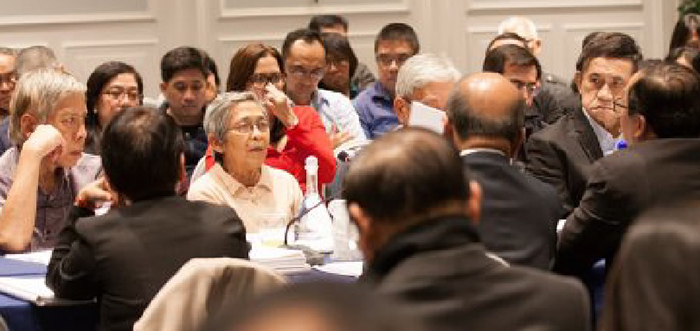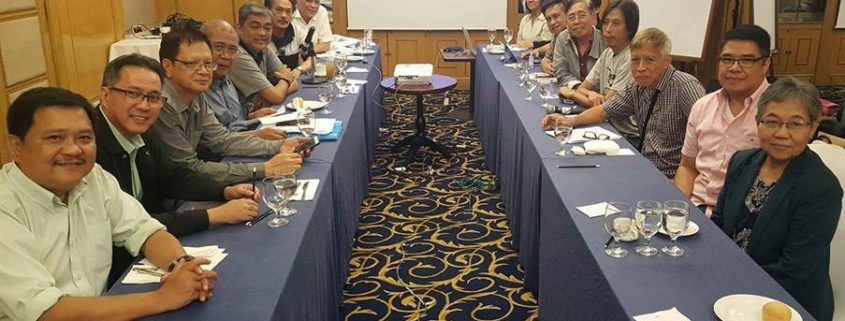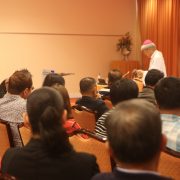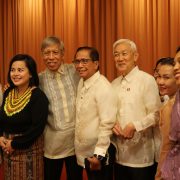NDFP: Esperon and Galvez out to sabotage talks by attacking CASER
National security adviser Hermogenes C. Esperon, Jr. and presidential peace adviser Carlito G. Galvez Jr. are ignorant in their statements against the Comprehensive Agreement on Social and Economic Reforms (CASER), National Democratic Front of the Philippines (NDFP) negotiators said.
In a statement Tuesday, the NDFP Reciprocal Working Committee on Socio-Economic Reforms (RWC-SER) said the two former Armed Forces of the Philippines chiefs of staff aim to “malicioudly distort” the “considerable progress” made by the negotiating panels of both the NDFP and the Government of the Republic of the Philipines (GRP).
“They are showing themselves as chronic saboteurs of the peace process and are proving to be among the biggest obstacles to peace in the country,” the NDFP’s RWC-SER said.
Esperon and Galvez came out with statements last week discouraging the Rodrigo Duterte government from resuming peace negotiations with the NDFP, alleging the CASER is “treasonous”.
“CASER is based on an obsolete framework and is no longer relevant since it is largely based on the pre-industrialization and pre-globalization era. It is a formula for the surrender of the national government’s integrity as well as the state’s sovereignty,” Galvez also said.
Esperon for his part expressed opposition to the planned revival of peace talks with the NDFP, accusing the CASER of reflecting the NDFP’s “duplicitous character and self-interest.”
The NDFP however said the CASER offers real social and economic reforms and is critically important to the Filipino people as it addresses the roots of armed conflict such as poverty, inequality and underdevelopment.
Free land distribution and long-term development
The NDFP said the the Agrarian Reform and Rural Development (ARRD) section of the approved common draft between itself and the GRP includes free land distribution and the writing-off of farmers’ debts under the government’s land reform programs.
Agrarian reform shall cover plantations and large-scale commercial farms with leasehold, joint venture, and non-land transfer schemes such as the infamous stock distribution option. There are also reforms in fisheries and aquatic resources, the NDFP said.
It explained that farmers and fisherfolk will also be provided a wide range of support services and benefit from the elimination of exploitative lending and trading practices in the countryside.
ARRD also includes clear commitments to build rural infrastructure, develop rural industries, and improve domestic science and technology, it said.
The approved common draft on National Industrialization and Economic Development (NIED) critically affirms the importance of national industrialization for long-term development, the NDFP said.
It recognizes the need for sound planning and regulation of foreign investment to develop specific industries. The benefits of nationalized public utilities and mining, of Filipino processing of minerals and trading, and of breaking foreign monopoly control of industrial technologies are also well-understood, the group revealed.
The NDFP also said the NIED aims to develop Filipino industrial science and technology, the important role of workers is acknowledged and they will be given a greater role in the running of enterprises.
Financing for industrialization will be raised from progressive taxes, luxury and sin taxes, official aid, foreign investment and other sources, the group explained.
The NDFP said that remaining issues on CASER such as environment protection, Filipino culture deveopment, decent employment, social protection, free education and health, affordable housing and utilities, upholding indigenous peoples’ (IP’s) rights and asserting economic sovereignty may be easier to reach once formal negotiations resume.
Esperon and Galvez’s criticisms of the NDFP draft CASER are moot because both the GRP and the NDFP have already mutually agreed on common drafts of the ARRD and NIED, the group pointed out.
“The NDFP and GRP shared ideas and sought creative solutions to the country’s social and economic problems. The common drafts show that it is possible for the Parties to set aside ideological differences and unite on concrete steps for the common cause of real economic progress for the nation,” the NDFP said.
No backchannel maneuvers

Contrary to Galvez’s claim that CASER is a product of a secret backchannel maneuver, the common drafts were widely taken in public consultations nationwide, including New People’s Army guerilla zones, the NDFP said.
The NDFP and the GRP each presented their own draft versions of the CASER to the negotiating table and were negotiated in good faith to produce a mutually agreed program of social and economic reforms, it added.
The GRP panel for its part also reported numerous multi-agency meetings on the CASER attented by its own line agencies, Congress, local government officials, and the academe in the formal rounds abroad as well in the bilateral team meetings in the Philippines.
The NDFP pointed out that the common drafts were produced with officials from the National Economic and Development Authority, Department of Agrarian Reform, Department of Agriculture, Department of Environment and Natural Resources, National Commission on Indigenous Peoples, Land Bank of the Philippines, Department of Finance, Department of Trade and Industry, and Department of Science and Technology with inputs from academics of the University of the Philippines, De La Salle University, and Ateneo de Manila University.
Members of the Peace, Reconciliation and Unity Committee of the House of Representatives were also present from the second to the fourth rounds of formal talks in Norway, Italy and The Netherlands from 2016 to 2017.
The common outline for the CASER and common drafts on the sections on ARRD and NIED were crafted after four formal rounds of talks abroad and seven meetings in the Philippines by both the GRP and the NDFP RWCs.
“These mutually agreed common drafts were prepared by the bilateral teams for CASER of the NDFP and GRP, received by their respective Reciprocal Working Committees for Social and Economic Reforms (RWCs-SER) in November 2017, and are up for approval by the NDFP and GRP panels upon a resumption of talks,” the NDFP said.
It added that the CASER will be an expansive deal with 11 substantive sections of policy reforms.
Esperon and Galvez intentionally muddle the NDFP’s unilateral draft version of the CASER with the negotiated and mutually agreed CASER that the peace talks will produce. They maliciously diminish and vilify the progress that the peace talks have made to sabotage this and give way to their narrow-minded hawkish militarism, the NDFP said. # (Raymund B. Villanueva)







